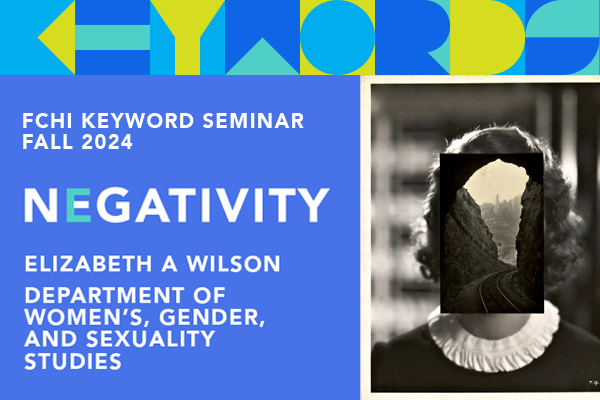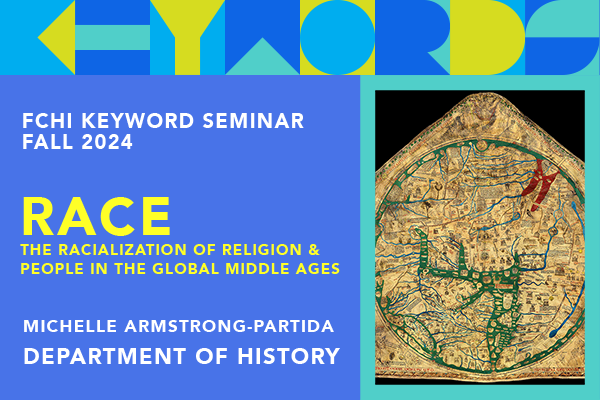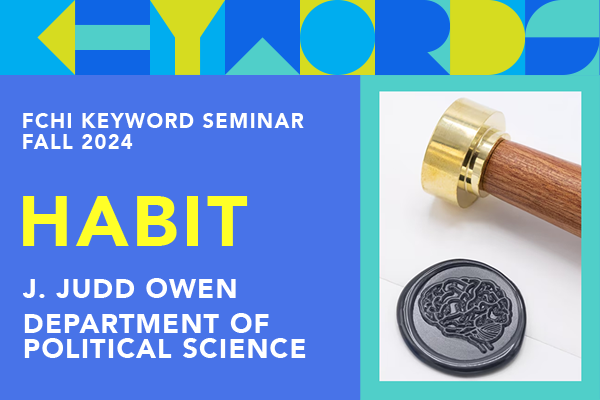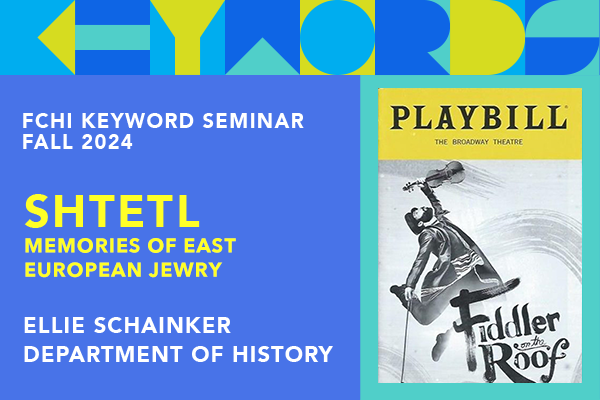Keywords
Our Keyword series connects our former faculty fellows with new audiences through seminars and lectures. Each Keyword takes a single concept or idea—encapsulated by a single word, which may be expanded by a subtitle—and explores it from a particular vantage point. Some Keywords are aimed at students or fellow researchers, while others are designed for a public audience.
Keyword Seminars comprise four weekly sessions over the course of a month, while Keyword Lectures are single presentations of original material for a larger audience. Our Keyword program is generously supported by the National Endowment for the Humanities.
Registration information for our 2024-25 Keywords can be found under each description below.
2024-2025 Keywords

Negativity
There has been considerable interest in recent years in queer/trans/feminist theory in reading for negativity. Psychoanalytic theory has been central to many of these arguments. This seminar will examine some key psychoanalytic texts that delineate the corrosive force of the unconscious and the negativity/destruction that is constitutive of psychic and social structure. We will begin with the important conceptual and political distinctions between bad feeling, negation, and negativity.
Moderated by Elizabeth Wilson, Department of Women's, Gender, and Sexuality Studies.
September 20, September 27, October 4, and October 11, 2024, from 12 noon to 1:30pm. Fox Center Seminar Room. Open to the Emory community.
This seminar is full and registration has closed.

Race
The Racialization of Religion and People in the Global Middle Ages
The myth of a pre-racial Middle Ages has led to racist appropriations of the past, such as those by White supremacist nationalists who use the Middle Ages to perpetuate a fantasy of a "Whites Only" medieval world.To directly confront the fallacy of a White Christian medieval world and illustrate the real presence of people of color and various faiths in Europe, we must directly deal with the issue of racein our research and teaching. In thinking about premodern critical race theory and the racialization of religion in the global Middle Ages, this Keyword reading group invites participants to discuss the work of scholars such as Geraldine Heng, Cord Whitaker, Kristina Richardson, Sierra Lomuto, Rachel Schine, and Howard Williams.
Moderated by Michelle Armstrong-Partida, Department of History.
September 23, October 7, and October 28, 2024, from 12 noon to 1.30pm. Fox Center Seminar Room. Open to the Emory community.
This seminar is full and registration has closed.

Habit
Lessons from Aristotle and Neuroscience
Habit has been called our “other self.” It invisibly governs much of our behavior, thought, and emotion. But we also have the capacity to direct our habits in order to improve our well being and even our character. In this seminar, we will explore lessons from the neuroscience of habit, before turning to Aristotle’s surprising millennia-old anticipation of those lessons. We will consider how Aristotle’s account of habit becomes foundational to his teaching on happiness, moral virtue, education, and legislation.
Moderated by Judd Owen, Department of Political Science.
October 24, October 31, and November 7, 2024, from 7pm to 8.30pm. Fox Center Seminar Room. Open to all.
This seminar is full and registration has closed.

Shtetl
Memories of East European Jewry
In this seminar, we will read key texts that helped shapecontemporary images of East European Jewry as dominated by piety, poverty, and pogroms. Rather than tackling the millennium-long and diverse history of East European Jewry, we’ll explore the ethnographic, photographic, literary, and theatrical sources from the 20th century that shaped public perceptions of East European Jewry both before and after the Holocaust. Throughout, we’ll question what these sources tell us not so much about East European Jewry but about the 20th-century urban and diaspora Jews who created these images, exhibits and stories.
Moderated by Ellie Schainker, Department of History.
January 21, January 28, and February 4, 2025, from 7pm to 8:30pm. Fox Center Seminar Room. Open to all.
Registration will open in November 2024.
Madness
Psychiatry and Civil Rights in the Jim Crow South
What does it mean to talk about madness especially at the intersection with racism? Drawing on the research for her book Jim Crow in the Asylum: Psychiatry and Civil Rights in the American South (UNC Press, 2025), Dr. Kylie Smith explores the ethical and archival challenges of trying to piece together the story of psychiatric hospitals in the Jim Crow South. The history of psychiatry looks different through the lens of segregation and incarceration and complicates the way we think about the term “madness”, especially in the context of Civil Rights activism. There are lessons from this history not just for unpacking mental health disparities today but for the very legitimacy of psychiatry itself.
Lecture by Kylie Smith, Nell Hodgson Woodruff School of Nursing.
March 5, 2025 from 4pm to 5:30pm. Jones Room, Woodruff Library. Open to all.
Registration will open in January 2025.
Re-gendering
Complex, Messy, and Diverse Gender Norms of the New Testament World
Modern readers often envision biblical gender norms as a version of our own in the not-so-distant past: two opposite genders, men dominating women, and strictly policed boundaries between the genders. But what if the roles, norms, and virtues of the Roman world were conceived of so differently that our own conceptions do not fit? In this class, we’ll look at evidence from literary and archaeological sources of the New Testament period and discover that gender was complex, messy, and diverse. Gender norms included variability in standards for masculine and feminine behavior and multiple genders.
Moderated by Susan E. Hylen, Candler School of Theology.
Dates TBD. Held virtually via Zoom. Open to all.
Registration will open in Spring 2025.